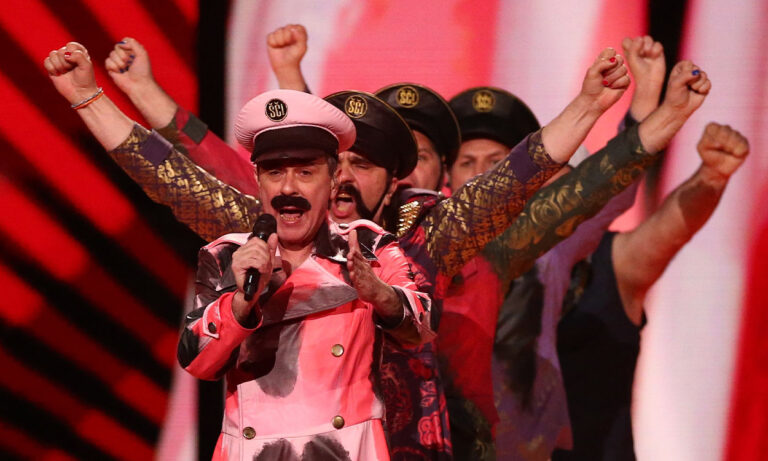Croatia’s 2023 Eurovision song proves political messages are unavoidable in the song contest

Ok, now that King Charles’ coronation is officially over, we can finally start to celebrate the true national event of the year, one even the grouchiest and most anti-UK gen Zers can get behind: the Eurovision song contest. While the annual singing competition used to be something Brits made fun of (mostly because our entries always did so badly), this year, we’re hosting. This means that despite the fact we’re still very much aware of the post-Brexit European sentiment, a lot of people are excited to participate in a massive celebration that’s actually worthy of our pride.
Taking place in Liverpool, the Eurovision semi-finals occur on Tuesday 9 May and Thursday 11 May, with the final happening on Saturday 13 May. There’s still a lot of mystery regarding some of the performances, but one particular country has already begun making waves with its seemingly politically-charged anthem.
Croatia’s track for this year is titled ‘Mama ŠČ!’ and is being performed by the group Let 3. When the song was chosen as the nation’s entry for this year’s competition, some Croatians began to publicise their unhappiness at the decision.
And, before you say anything, no, people weren’t displeased because of the massive moustaches that would put the likes of Mario and Luigi to shame, they were upset due to the nature of the song’s content. According to a recent Reddit thread shared by a Croatian citizen, the track—which has been described as inherently anti-war—includes lyrics such as “that little psychopath” and “a mean little psychopath.”
While these might seem arbitrary on the surface, a lot of people have insinuated that Let 3 are talking about Russian President Vladmir Putin. Moreover, one specific line, which translates to “mom bought a tractor,” allegedly refers to Mother Russia buying Belarus.
Netizens were definitely split online, with some applauding the group for calling out Putin and making a clear stance regarding the war in Ukraine. Others strongly believed that political topics should be strictly avoided during the Eurovision—some even went so far as to blame Let 3’s expensive attire on liberal concern about challenging gender conventions.
Fuck you and fuck those far-left idiots that we sent to the Eurovision
— Lux (@Cro__Lux) May 8, 2023
This is comftorably the WORST song and group Croatia has ever sent to the Eurovision https://t.co/kxtVUGFLrf
But Croatia is not the first (nor will it be the last) nation to bring politics to the Eurovision stage. Here are three other countries who have performed songs which were considered “politically-motivated.”
1. Conchita Wurst for Austria
In 2013, drag queen Conchita Wurst was chosen to represent Austria at the 2014 Eurovision competition. Despite the annual event’s taste for campness and queer expression, Wurst’s participation sent shockwaves through Europe and was deemed highly political by a number of spectators and pundits.
Petitions emerged from a number of Eastern European nations, demanding Wurst be removed from the competition. However, the drag queen was not disheartened or put off and in one of the most iconic Eurovision moments of all time, Wurst completely demolished the competition and took home the trophy as winner.
2. Armenia and its song ‘Face The Shadow’
In 2015, Armenia had to rechange the name of its song after it was deemed too political by neighbouring countries. The track, which was originally called ‘Don’t deny’ was criticised by Turkey and Azerbaijan because the lyrics alluded to the two nations denying the historic Armenian genocide which claimed the lives of between approximately 600,000 to 1.5 million people.
According to The Independent, the music video also drew a lot of criticism with some alleging that its visuals alluded to the genocide, notably a scene showing the band posing for a family photo in World War I clothes before disappearing.
3. Ukraine and Russia
While there isn’t one particular song or moment that encapsulates the political tension and controversies surrounding Ukraine and Russia’s involvement with the Eurovision contest over the years, their international relationship (or lack thereof) has inherently impacted a number of the competitions.
Most impactful, of course, has been Russia’s exclusion from the competition in 2022, following the nation’s invasion of neighbouring Ukraine. Whether or not the country will ever be allowed back into the Eurovision cohort is a whole other story.
In reality, Eurovision has always been a forum for political expression and radical activism, and that’s a good thing. Of course, there’s a novelty to hosting an annual event which is solely dedicated to music, fun, and European patriotism. But it would be unnatural and unfair to expect artists to take to the stage each year, perform, and then not be allowed to share a message with the world.





